新版新概念英语第一册第28课课堂笔记
- 格式:docx
- 大小:38.05 KB
- 文档页数:7
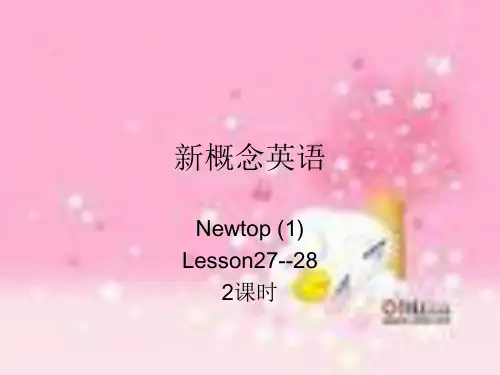
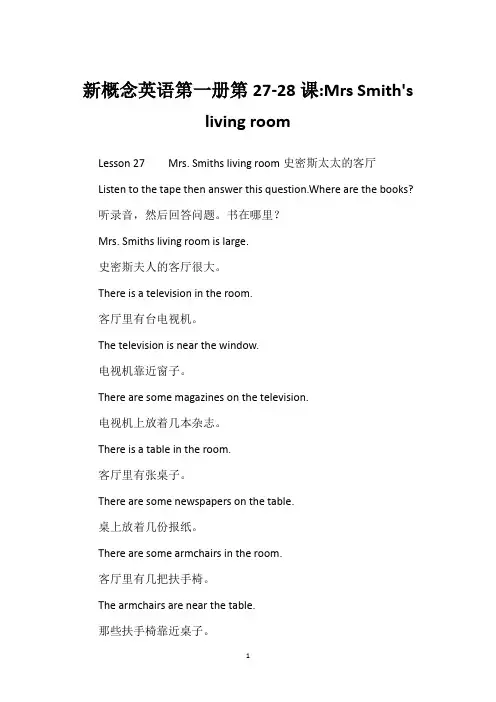
新概念英语第一册第27-28课:Mrs Smith'sliving roomLesson 27 Mrs. Smiths living room史密斯太太的客厅Listen to the tape then answer this question.Where are the books?听录音,然后回答问题。
书在哪里?Mrs. Smiths living room is large.史密斯夫人的客厅很大。
There is a television in the room.客厅里有台电视机。
The television is near the window.电视机靠近窗子。
There are some magazines on the television.电视机上放着几本杂志。
There is a table in the room.客厅里有张桌子。
There are some newspapers on the table.桌上放着几份报纸。
There are some armchairs in the room.客厅里有几把扶手椅。
The armchairs are near the table.那些扶手椅靠近桌子。
There is a stereo in the room.客厅里有台立体声音响。
The stereo is near the door.音响靠近门。
There are some books on the stereo.音响上面有几本书。
There are some pictures in the room.客厅里有几幅画。
The pictures are on the wall.画挂在墙上。
New Word and expressions 生词和短语living room客厅nearprep.靠近windown. 窗户armchairn. 扶手椅doorn. 门picturen. 图画walln. 墙Notes on the text课文解释1 There are的结构中要用复数名词。
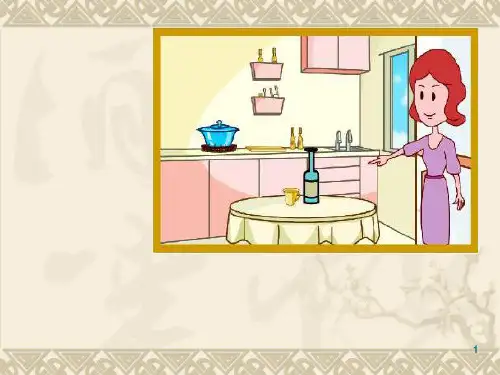
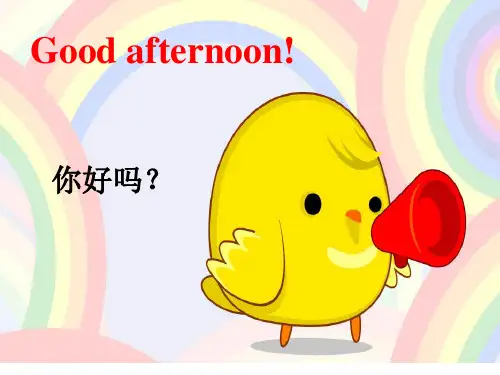
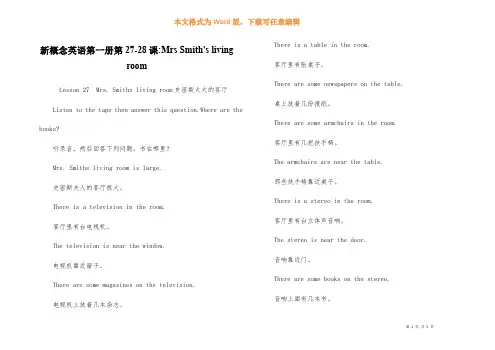
新概念英语第一册第27-28课:Mrs Smith's livingroomLesson 27 Mrs. Smiths living room史密斯太太的客厅Listen to the tape then answer this question.Where are the books?听录音,然后回答下列问题。
书在哪里?Mrs. Smiths living room is large.史密斯夫人的客厅很大。
There is a television in the room.客厅里有台电视机。
The television is near the window.电视机靠近窗子。
There are some magazines on the television.电视机上放着几本杂志。
There is a table in the room.客厅里有张桌子。
There are some newspapers on the table. 桌上放着几份报纸。
There are some armchairs in the room. 客厅里有几把扶手椅。
The armchairs are near the table.那些扶手椅靠近桌子。
There is a stereo in the room.客厅里有台立体声音响。
The stereo is near the door.音响靠近门。
There are some books on the stereo.音响上面有几本书。
There are some pictures in the room. 客厅里有几幅画。
The pictures are on the wall.画挂在墙上。
New Word and expressions 生词和短语living room客厅nearprep.靠近windown. 窗户armchairn. 扶手椅doorn. 门picturen. 图画walln. 墙Notes on the text课文解释1 There are的结构中要用复数名词。
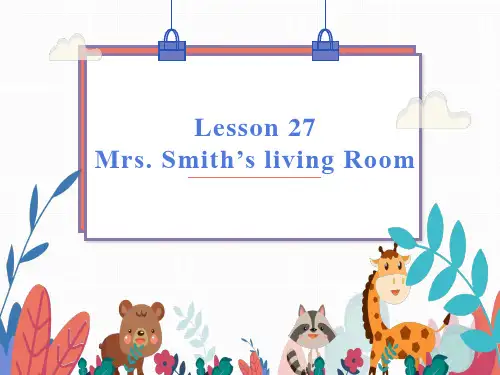
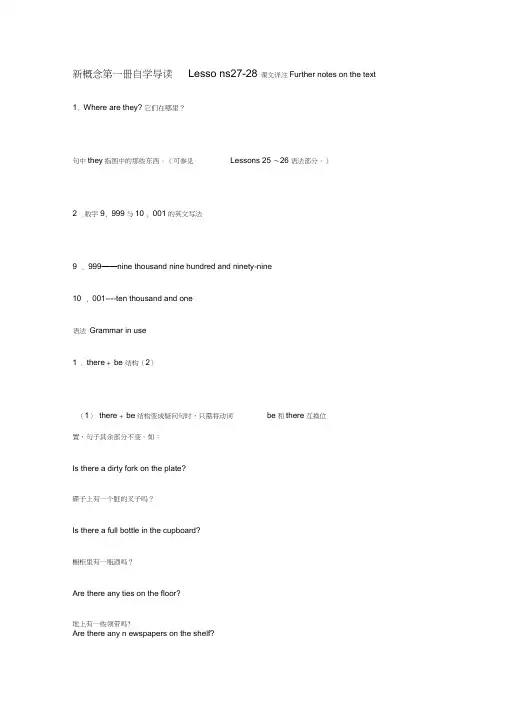
新概念第一册自学导读Lesso ns27-28 课文详注Further notes on the text 1. Where are they? 它们在哪里?句中they指图中的那些东西。
(可参见Lessons 25 〜26语法部分。
)2 .数字9, 999与10 , 001的英文写法9 , 999——nine thousand nine hundred and ninety-nine10 , 001----ten thousand and one语法Grammar in use1 . there + be 结构(2)(1)there + be结构变成疑问句时,只需将动词be和there互换位置,句子其余部分不变。
如:Is there a dirty fork on the plate?碟子上有一个脏的叉子吗?Is there a full bottle in the cupboard?橱柜里有一瓶酒吗?Are there any ties on the floor?地上有一些领带吗?Are there any n ewspapers on the shelf?架子上有些报纸吗?(2) there + be结构变成否定句时,需在动词be后加not (any )或no。
如:No, there is not a fork on the plate.没有,碟子上没有叉子。
No, there isn't one in the cupboard.没有,橱柜里一个也没有。
No, there aren't any ties on the floor.没有,地板上没有任何领带。
No, there are no n ewspapers on the shelf.没有,架子上没有任何报纸。
2 . some 和any 的用法在英语中,some和any是两个最常用的数量词。
用some和any时,一般不必精确地说明数量到底有多么大或多么小。
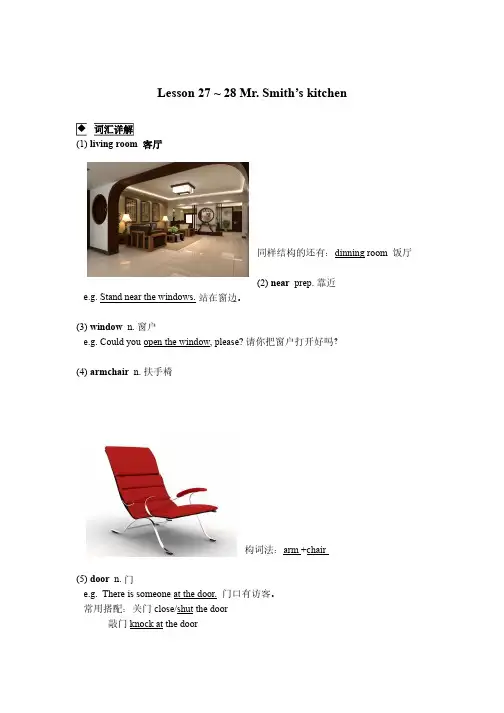
Lesson 27 ~ 28 Mr. Smith’s kitchen(1) living room 客厅同样结构的还有:dinning room 饭厅(2) near prep. 靠近e.g. Stand near the windows. 站在窗边。
(3) window n. 窗户e.g. Could you open the window, please? 请你把窗户打开好吗?(4) armchair n. 扶手椅构词法:arm +chair(5) door n. 门e.g. There is someone at the door. 门口有访客。
常用搭配:关门 close/shut the door敲门 knock at the door(6) picture n. 图画e.g. Draw a picture of your room. 画一张你房间的图画。
(7) wall n. 墙常用词组:在墙上 on the wall 指在墙的表面上;in the wall 指在墙体里e.g. There is a picture on the wall. 墙上有一幅画。
There are some nails in the wall. 墙上有一些钉子。
(8) trousers n. 长裤(复数名词,没有单数形式)e.g. There are some trousers on your bed.你的床上有几条长裤。
同义词:pants(1)不定代词some与any●课文原句重现:There are some magazines on the television.结构:本句为There be 句型some与any的用法:e.g. There are some flowers in the garden. But there aren’t any blue flowers.May I have some water?✍试一试:请用There be句型改写下列句子。
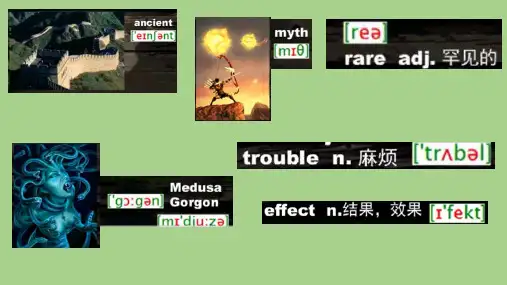
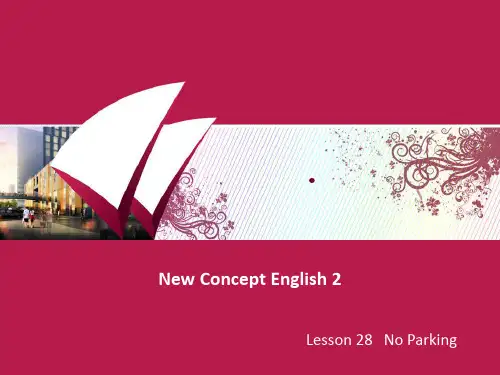
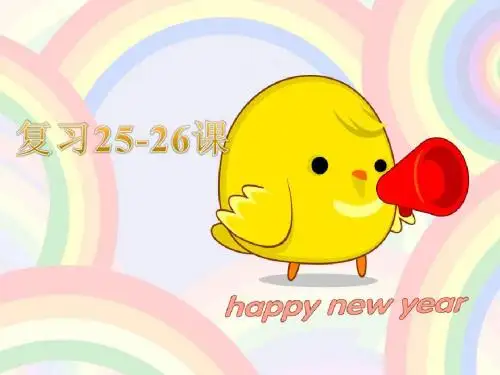
新概念英语第一册第27-28课内容介绍新概念英语第一册第27-28课内容介绍Lesson 27 Mrs. Smith's living room史密斯太太的客厅Listen to the tape then answer this question.Where are the books?听录音,然后答复下列问题。
书在哪里?Mrs. Smith’s living room is large.史密斯夫人的客厅很大。
There is a television in the room.客厅里有台电视机。
The television is near the window.电视机靠近窗子。
There are some magazines on the television.电视机上放着几本杂志。
There is a table in the room.客厅里有张桌子。
There are some newspapers on the table.桌上放着几份报纸。
There are some armchairs in the room. 客厅里有几把扶手椅。
The armchairs are near the table.那些扶手椅靠近桌子。
There is a stereo in the room.客厅里有台立体声音响。
The stereo is near the door.音响靠近门。
There are some books on the stereo. 音响上面有几本书。
There are some pictures in the room. 客厅里有几幅画。
The pictures are on the wall.画挂在墙上。
New Word and expressions 生词和短语living room客厅nearprep.靠近windown. 窗户armchairn. 扶手椅doorn. 门picturen. 图画walln. 墙Notes on the text课文注释1 There are的构造中要用复数名词。
lesson 28Pre-taskWhat is Jasper's trouble ?What has he put up outside his gate ?Why has he put the stone head of Medusa over his gate ?New Words rare 罕见的ancient 古代的mtyh 神话故事trouble 麻烦effect 结果,效果Medusa 美杜莎(古希腊神话中3位蛇发女怪之一)GorgonRare形容词a.1.稀有的,罕见的These flowers are very rare in this country. 这些花在该国很少见。
It is rare for (sb)to do sth 某人很少做某事2.杰出的,珍贵的Gold is a rare metal.金子是贵重金属。
3.稀薄的,稀疏的The higher you climb up the mountain, the rarer the air is.越往山上爬,空气越稀薄。
Rarity n. 珍品,奇事Rareness n. (空气等)稀薄,稀有Rarely adv. 不常(否定含义)Not often, seldomEg. I rarely eat in restaurants.I often cook myself.Ancient形容词a.1.古代的We were impressed by the ruins of an ancient building.我们对一处古建筑废墟印象颇深。
2.古老的;古旧的,旧的He drives an ancient car.他开着一辆老式汽车。
3.自古以来的This is an ancient custom.这是一个自古相传下来的习俗。
古代文明an ancient civilization 古代历史an ancient historyMyth名词n.1.神话[C][U]The Greeks had many myths.希腊人有许多神话。
Lesson 28 Five pounds to dearSmall boats loaded with wares sped to the great liner as she was entering the harbor. Loaded with 过去分词作定语As 引导的时间状语从句Liner 大船Before she had anchored, the men from the small boats had climbed on board and the decks were soon covered with colorful rugs from Persia, silks from India, copper coffee pots, and beautiful handmade silverware.Before 引导时间状语从句From 介词短语,修饰menOn board 介词短语,解释climb 到了那儿Deck甲板Rug 地毯Copper 铜制的It was difficult not to be tempted.It做形式主语,not to be tempted 真正主语Many of the tourists on board had begun bargaining with the tradesmen, but I decided not to buy anything until I had disembarked.Many tourist 泛指所有的游客。
Many of the tourists on board是特指这艘大船上的游客,用了the.Begin-began-begunBegin doing / begin to doBargain with sb 与……讨价还价Decide (not) to do sthNot… until 直到……才Disembark 下船上岸I had no sooner got off the ship than I was assailed by a man who wanted to sell me a diamond ring.No sooner … than一……就: sooner than 比……早,no sooner than 不比……早(no 副词)我下船不比被人纠缠早多少,翻译为我一下船就被人纠缠Assail 纠缠I had no intention of buying one, but I could not conceal the fact that I was impressed by the size of the diamonds.Have no intention of 没有……企图Some of them were as big as marbles. The man went to great lengths to prove that the diamonds were real.Go to great lengths to do 竭尽全力去做某事As we were walking past a shop, he held a diamond firmly against the window and made a deep impression in the glass.Against 靠在Made a deep impression 留下一个深深压痕It took me over half an hour to get rid of him.It takes sb 一段时间/ 钱to do sthThe next man to approach me was selling expensive pens and watched.To approach me 不定式,做形容词I examined one of the pens closely. It certainly looked genuine. At the base of the gold cap, the words ‘made in the U. S. A.’ had been neatly inscribed.Gold cap 金色笔盖Words ‘‘ 引用Inscribe 篆刻The man said that the pen was worth $50, but as a special favor, he would let me have it for $300.Be worth sthHave sth for +价格I shook my head and held five fingers indicating that I was willing to pay $5. Gesticulating wildly, the man acted as if he found my offer outrageous, but he eventually reduced the price to $10.Shake one’s head 摇头Indicating 表示, which indicate 的省略Gesticulate 做手势As if 似乎,引导状语从句。
新版新概念英语第一册第28课课堂笔记
Lesson 83 Going on holiday 度假
[词汇]
mess n. 杂乱,凌乱
pack v. 包装,打包,装箱
suitcase n. 手提箱
leave v. 离开
already adv. 已经
语法
现在完成时:
1 表示在过去不确定的时间里发生的并与现在相关某种联系的动作
2 表示开始于过去并持续到现在的动作
过去时强调过去某个特定的时间发生的动作或存有的状态
现在完成时表示过去不确定的时间里发生的动作对现在造成的影响和结果,这个动作也许到现在结束,也许还要继续下去。
主语 + has/have + 动词的过去分词
否定形式:hasn't/haven't
疑问形式:把 has/have 提前
PP. 过去分词
过去分词的规则形式与过去时是一样的。
buy bought bought find found found get got got
have had had
hear heard heard leave left left lose lost lost make made made meet met met send sent sent sweep swept swept tell told told cut cut cut
put put put
read read read set set set
shut shut shut
do did done
come came come give gave given swim swam swum
take took taken
eat ate eaten
go went gone
rise rose risen
see saw seen
speak spoke spoken
I see a film every week.
My mother sees a film every week.
I saw a film last week.
I have seen the film.
I haven't seen the film.
Have you seen the film?
do did done
I do my Homework every day.
My sister does her Homework every day.
I did my Homework the day before yesterday.
I have done my Homework.
I haven't done my Homework.
Have you done your Homework?
Has she done her Homework?
have had had。